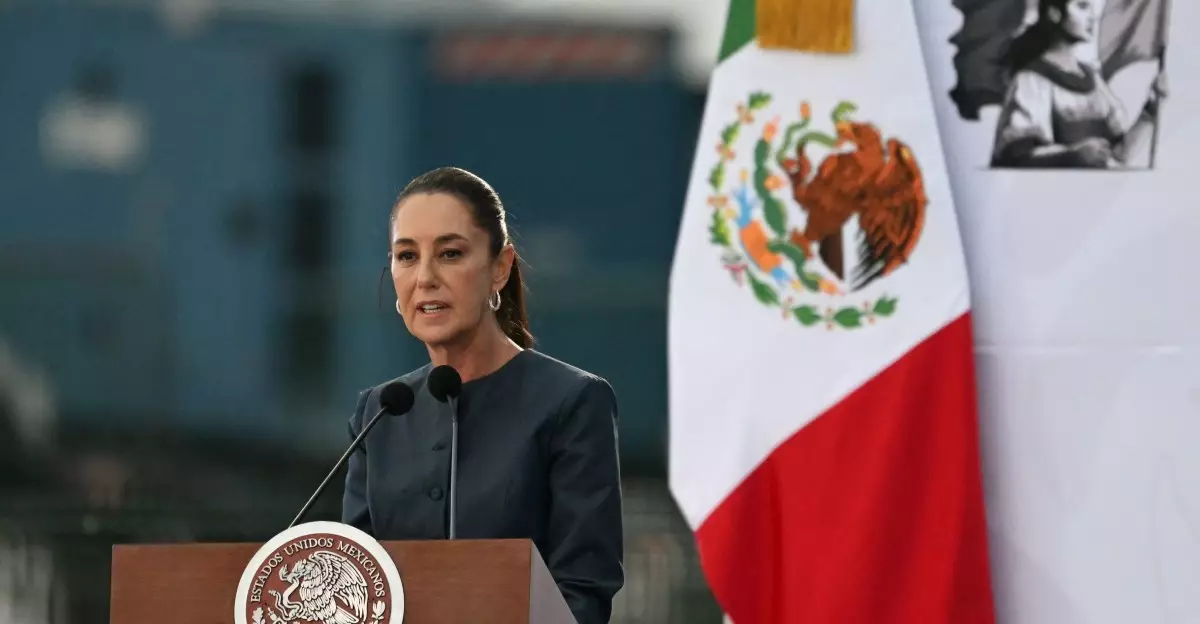In a world where political dynamics intersect with cultural identity, the recent controversy surrounding the Gulf of Mexico and its renaming to the “Gulf of America” raises alarms regarding national sovereignty and digital representation. Led by Mexican President Claudia Sheinbaum, the Mexican government has taken a bold step by suing Google for its compliance with a controversial name change initiated under the Trump administration. This lawsuit is not merely about a geographical term; it symbolizes the ongoing struggle for recognition and respect for national identities within the global landscape.
Renaming landmarks and bodies of water has historically been a means through which power dynamics manifest. The renaming of the Gulf is a stark reminder of how seemingly small adjustments can have far-reaching implications. This case suggests that geographical names are inherently political and that the entities behind digital platforms have a responsibility to reflect international agreements and collaborations rather than unilateral adaptations that favor one nation.
The Legal and Cultural Implications
When President Trump ordered that the Gulf of Mexico be relabeled, it was not just an act of creativity; it was a declaration of intent. His administration’s push for such changes reflected a broader ‘America First’ sentiment, positioning American nomenclature above international recognition. President Sheinbaum’s response can be interpreted as an act of defiance against this trend, declaring that parts of the Gulf cannot be claimed solely by the United States. This stance aligns with the concept of collective ownership of geographical features that exist within a shared international space.
The crux of the legal argument, as articulated by Sheinbaum, hinges on the assertion that the U.S. government lacks the authority to redefine the entire Gulf under its jurisdiction. This point is critical. Geographic names are not merely labels; they carry significant cultural weight and historical context. They encapsulate identity and heritage, and changing them can erase the very essence of what those places represent. Therefore, Google’s role in this saga is pivotal. As a digital information provider, the company must navigate the delicate balance of adhering to U.S. directives while respecting the historical accuracy and cultural significance of names.
Tech Giants in Political Controversies
This lawsuit places Google in the spotlight, as it must contend not only with legal ramifications but also with public perception. When Google openly complied with the Trump administration’s request, it touched off a series of reactions across the political divide. Critics argue that tech companies must avoid becoming pawns in the political games of powerful entities. They should instead operate with an ethical compass that respects international norms and cultural sensitivities while also being transparent about their policies.
Adapting geographic names in their platforms, Google and other tech companies set a precedent that could alter how nations interact with one another. This incident could lead to a cascade of actions, wherein nation-states one-up each other through digital cartography. With the clout that Google carries, its platforms shape the understanding of international geography for millions. The implications of their decision to display the Gulf as the “Gulf of America” extend beyond cartography; they influence diplomatic relations and public sentiment.
A Symbolic Battle for Representation
In asserting their claims against Google, President Sheinbaum and the Mexican government are engaging in a symbolic battle for representation that transcends mere territorial disputes. It delves into the heart of nationhood and cultural identity, challenging the world to rethink how digital landscapes represent real-world complexities. The fight against the renaming of the Gulf of Mexico embodies a broader narrative about the importance of recognizing and respecting local histories and identities in an increasingly globalized world.
Moreover, as nations become more digitally interconnected, there is a compelling argument to ensure that intelligent cartography accounts for these perspectives. The events surrounding the Gulf of Mexico provoke essential discussions about the role of technology in international relations and how it can either bridge or widen existing divides.
The unfolding events reveal a multifaceted struggle that goes beyond geographical nomenclature to encompass themes of identity, sovereignty, and the influence of technology in our interconnected world. The Gulf of Mexico serves as a critical juncture for exploring how we define and understand our shared spaces in an era dominated by digital representation.

